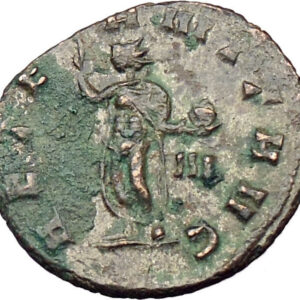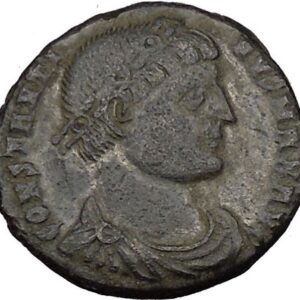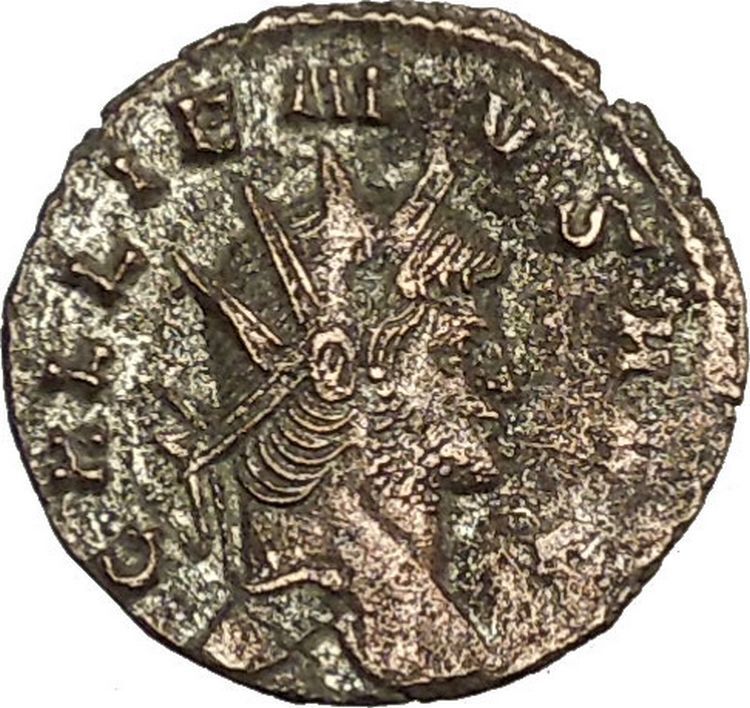|
Faustina II – Roman Empress & Wife of Emperor Marcus Aurelius – 161-175 A.D.
Bronze Dupondius 24mm (11.1 grams) Rome mint, struck circa 161-175 A.D.
Reference: RIC 1395; Cohen 108.
FAVSTINA AVG PII AVG FIL, draped bust right, stephane round head.
FELICITAS SC, Felicitas standing right, holding caduceus.
You are bidding on the exact item pictured, provided with a Certificate of Authenticity and Lifetime Guarantee of Authenticity.
In ancient Roman culture, felicitas (from the Latin adjective felix, “fruitful, blessed, happy, lucky”) is a condition of divinely inspired productivity, blessedness, or happiness. Felicitas could encompass both a woman’s fertility, and a general’s luck or good fortune. The divine personification of Felicitas was cultivated as a goddess. Although felicitas may be translated as “good luck,” and the goddess Felicitas shares some characteristics and attributes with Fortuna, the two were distinguished in Roman religion. Fortuna was unpredictable and her effects could be negative, as the existence of an altar to Mala Fortuna (“Bad Luck”) acknowledges. Felicitas, however, always had a positive significance. She appears with several epithets that focus on aspects of her divine power.
Felicitas had a temple in Rome as early as the mid-2nd century BC, and during the Republican era was honored at two official festivals of Roman state religion, on July 1 in conjunction with Juno and October 9 as Fausta Felicitas. Felicitas continued to play an important role in Imperial cult, and was frequently portrayed on coins as a symbol of the wealth and prosperity of the Roman Empire. Her primary attributes are the caduceus and cornucopia. The English word “felicity” derives from felicitas.
As virtue or quality
In its religious sense, felix means “blessed, under the protection or favour of the gods; happy.” That which is felix has achieved the pax divom, a state of harmony or peace with the divine world. The word derives from Indo-European *dhe(i)l, meaning “happy, fruitful, productive, full of nourishment.” Related Latin words include femina, “woman” (a person who provides nourishment or suckles); felo, “to suckle” in regard to an infant; filius, “son” (a person suckled); and probably fello, fellare, “to perform fellatio”, with an originally non-sexual meaning of “to suck”. The continued magical association of sexual potency, increase, and general good fortune in productivity is indicated by the inscription Hic habitat Felicitas (“Felicitas dwells here”) on an apotropaic relief of a phallus at a bakery in Pompeii.
In archaic Roman culture, felicitas was a quality expressing the close bonds between religion and agriculture. Felicitas was at issue when the suovetaurilia sacrifice conducted by Cato the Elder as censor in 184 BC was challenged as having been unproductive, perhaps for vitium, ritual error. In the following three years Rome had been plagued by a number of ill omens and prodigies (prodigia), such as severe storms, pestilence, and “showers of blood,” which had required a series of expiations (supplicationes). The speech Cato gave to justify himself is known as the Oratio de lustri sui felicitate, “Speech on the Felicitas of his Lustrum”, and survives only as a possible quotation by a later source. Cato says that a lustrum should be found to have produced felicitas “if the crops had filled up the storehouses, if the vintage had been abundant, if the olive oil had flowed deliberately from the groves”, regardless of whatever else might have occurred. The efficacy of a ritual might be thus expressed as its felicitas.
The ability to promote felicitas became proof of one’s excellence and divine favor. Felicitas was simultaneously a divine gift, a quality that resided within an individual, and a contagious capacity for generating productive conditions outside oneself: it was a form of “charismatic authority”. Cicero lists felicitas as one of the four virtues of the exemplary general, along with knowledge of military science (scientia rei militaris), virtus (both “valor” and “virtue”), and auctoritas, “authority.” Virtus was a regular complement to felicitas, which was not thought to attach to those who were unworthy. Cicero attributed felicitas particularly to Pompeius Magnus (“Pompey the Great”), and distinguished this felicitas even from the divine good luck enjoyed by successful generals such as Fabius Maximus, Marcellus, Scipio the Younger and Marius.
The sayings (sententiae) of Publilius Syrus are often attached to divine qualities, including Felicitas: “The people’s Felicitas is powerful when she is merciful” (potens misericors publica est Felicitas).
Epithets
Epithets of Felicitas include:
- Augusta, the goddess in her association with the emperor and Imperial cult.
- Fausta (“Favored, Fortunate”), a state divinity cultivated on October 9 in conjunction with Venus Victrix and the Genius Populi Romani (“Genius” of the Roman People, also known as the Genius Publicus).
- Publica, the “public” Felicitas; that is, the aspect of the divine force that was concerned with the res publica or commonwealth, or with the Roman People (Populus Romanus).
- Temporum, the Felicitas “of the times”, a title which emphasize the felicitas being experienced in current circumstances.
 Annia Galeria Faustina Minor (Minor Latin for the younger), Faustina Minor or Faustina the Younger (February 16 between 125 and 130-175) was a daughter of Roman Emperor Antoninus Pius and Roman Empress Faustina the Elder. She was a Roman Empress and wife to her maternal cousin Roman Emperor Marcus Aurelius. Though Roman sources give a generally negative view of her character, she was held in high esteem by soldiers and her own husband and was given divine honours after her death. Annia Galeria Faustina Minor (Minor Latin for the younger), Faustina Minor or Faustina the Younger (February 16 between 125 and 130-175) was a daughter of Roman Emperor Antoninus Pius and Roman Empress Faustina the Elder. She was a Roman Empress and wife to her maternal cousin Roman Emperor Marcus Aurelius. Though Roman sources give a generally negative view of her character, she was held in high esteem by soldiers and her own husband and was given divine honours after her death.
Faustina, named after her mother, was her parents’ fourth and youngest child and their second daughter; she was also their only child to survive to adulthood. She was born and raised in Rome.
Her great uncle, the Emperor Hadrian, had arranged with her father for Faustina to marry Lucius Verus. On February 25, 138, she and Verus were betrothed. Verus’ father was Hadrian’s first adopted son and his intended heir. However when Verus’ father died, Hadrian chose Faustina’s father to be his second adopted son, and eventually, he became Hadrian’s successor. Faustina’s father ended the engagement between his daughter and Verus and arranged for Faustina’s betrothal to her maternal cousin, Marcus Aurelius; Aurelius was also adopted by her father. On May 13, 145, Faustina and Marcus Aurelius were married. When her father died on March 7, 161, her husband and Lucius Verus succeeded to her father’s throne and became co-rulers. Faustina was given the title of Augusta and became Empress.
Unfortunately, not much has survived from the Roman sources regarding Faustina’s life, but what is available does not give a good report. Cassius Dio and the Augustan History accuse Faustina of ordering deaths by poison and execution; she has also been accused of instigating the revolt of Avidius Cassius against her husband. The Augustan History mentions adultery with sailors, gladiators, and men of rank. However, Faustina and Aurelius seem to have been very close and mutually devoted. Her husband trusted her and defended her vigorously against detractors.
Faustina accompanied her husband on various military campaigns and enjoyed the love and reverence of Roman soldiers. Aurelius gave her the title of Mater Castrorum or Mother of the Camp. Between 170-174, she was in the north, and in 175, she accompanied Aurelius to the east. However, these experiences took their toll on Faustina, who died in the winter of 175, after an accident, at the military camp in Halala (a city in the Taurus Mountains in Cappadocia).
Aurelius grieved much for his wife and buried her in the Mausoleum of Hadrian in Rome. She was deified: her statue was placed in the Temple of Venus in Rome and a temple was dedicated to her in her honor. Halala’s name was changed to Faustinopolis and Aurelius opened charity schools for orphan girls called Puellae Faustinianae or ‘Girls of Faustina’.[1] The Baths of Faustina in Miletus are named after her.
In their thirty years of marriage, Faustina bore Marcus Aurelius thirteen children:
-
Annia Aurelia Galeria Faustina (147-after 165)
-
Gemellus Lucillae (died around 150), twin brother of Lucilla
-
Annia Aurelia Galeria Lucilla (148/50-182), twin sister of Gemellus, married her father’s co-ruler Lucius Verus
-
Titus Aelius Antoninus (born after 150, died before 7 March 161)
-
Titus Aelius Aurelius (born after 150, died before 7 March 161)
-
Hadrianus (152-157)
-
Domitia Faustina (born after 150, died before 7 March 161)
-
Fadilla (159-after 211)
-
Annia Cornificia Faustina Minor (160-after 211)
-
Titus Aurelius Fulvus Antoninus (161-165), twin brother of Commodus
- Commodus (161-192), twin brother of Titus Aurelius Fulvus Antoninus, later emperor
- Marcus Annius Verus Caesar (162-169)
- Vibia Aurelia Sabina (170-died before 217)
|





 Annia Galeria Faustina Minor (Minor Latin for the younger), Faustina Minor or Faustina the Younger (February 16 between 125 and 130-175) was a daughter of Roman Emperor Antoninus Pius and Roman Empress Faustina the Elder. She was a Roman Empress and wife to her maternal cousin Roman Emperor Marcus Aurelius. Though Roman sources give a generally negative view of her character, she was held in high esteem by soldiers and her own husband and was given divine honours after her death.
Annia Galeria Faustina Minor (Minor Latin for the younger), Faustina Minor or Faustina the Younger (February 16 between 125 and 130-175) was a daughter of Roman Emperor Antoninus Pius and Roman Empress Faustina the Elder. She was a Roman Empress and wife to her maternal cousin Roman Emperor Marcus Aurelius. Though Roman sources give a generally negative view of her character, she was held in high esteem by soldiers and her own husband and was given divine honours after her death.




